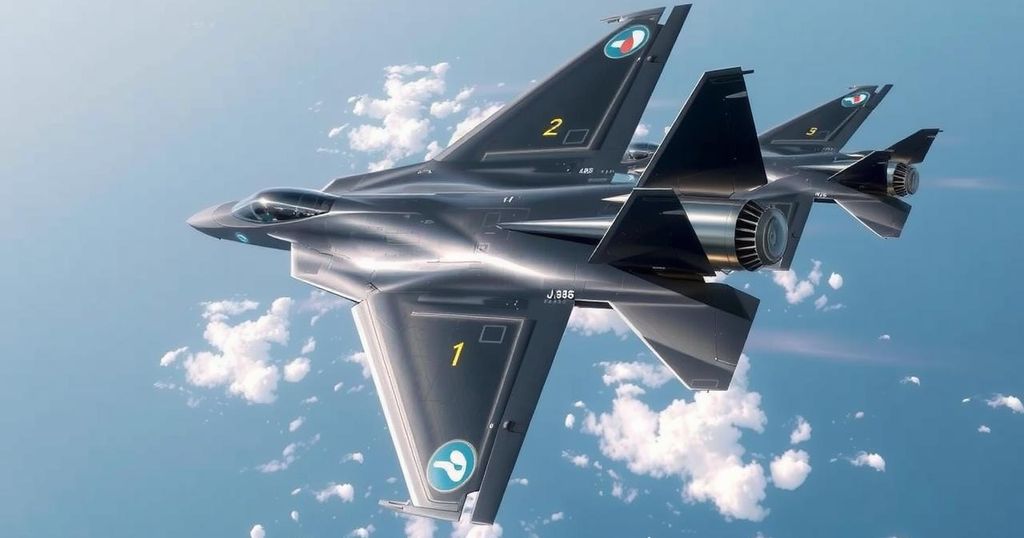Pakistan Seeks Acquisition of 40 Chinese J-35 Stealth Fighters Amid Economic Challenges
Pakistan is reportedly acquiring 40 J-35 stealth fighter jets from China despite economic difficulties. The deal remains unconfirmed officially, but discussions have intensified following high-level military visits. China continues to support Pakistan’s military modernization, including previously established partnerships for developing fighter jets. The geopolitical context involves security concerns related to Chinese investments in Pakistan amid heightened military cooperation.
Pakistan is reportedly pursuing an acquisition of 40 Chinese stealth fighter jets, specifically the J-35 model, despite facing significant economic challenges. There has yet to be official confirmation from Beijing regarding this rumored deal. Speculation surrounding the acquisition intensified after the J-35, deemed crucial for Chinese aircraft carriers, was showcased at the recent air show in Zhuhai, where high-ranking officials from the Pakistan Air Force (PAF) were in attendance. Notably, the land-based variant of this aircraft was previously referred to as the J-31.
China is the sole nation in the region with capabilities to develop stealth technology, reflecting a considerable advancement in military aviation. PAF Chief Air Marshal Zaheer Ahmed Baber Sidhu acknowledged that foundational agreements towards procuring the J-31 jets had been established earlier this year. The relationship between China and Pakistan is marked by deep military cooperation, with China significantly aiding the modernization of Pakistan’s military forces through substantial defense investments. This collaboration has resulted in joint projects, including the development of the J-17 Thunder fighter jet, which currently serves as a critical asset for the PAF.
Moreover, China has supplied Pakistan with advanced naval frigates to enhance the capabilities of its navy in strategic maritime regions like the Indian Ocean and Arabian Sea. The dialogue regarding the fighter jets follows the visit of General Zhang Youxia, a senior PLA official, to Pakistan, where he discussed various issues, including regional security and defense cooperation with Pakistan’s Army Chief General Asim Munir. This visit coincided with the deployment of 300 Chinese troops in Pakistan to assist in counter-terrorism operations, underscoring the heightened collaboration.
Despite enhanced cooperation, reports indicate that Pakistan is resisting Chinese pressure to deploy military personnel for the protection of Chinese workers involved in the China-Pakistan Economic Corridor (CPEC), primarily due to concerns over national sovereignty. In response to growing security challenges, Pakistan has reportedly mobilized over 30,000 military and paramilitary forces to ensure the safety of these workers.
The acquisition of military aircraft is a critical aspect of defense strategy, particularly for nations like Pakistan, which is currently grappling with economic hardships. The relationship between China and Pakistan is characterized by significant military collaboration, and the potential acquisition of advanced aircraft such as the J-35 reflects ongoing efforts to enhance defense capabilities. China’s prowess in stealth technology offers Pakistan a valuable opportunity to modernize its air force and remain competitive in the regional security landscape. The context surrounding the acquisition also encompasses broader geopolitical dynamics, particularly in relation to counter-terrorism operations and the protection of Chinese investments in Pakistan. The complexity of these relations necessitates a careful balance between national interests and collaborative defense efforts.
In summary, Pakistan’s intent to procure 40 J-35 stealth fighters from China represents a significant strategic move amidst economic challenges. The deepening military ties between the two nations highlight a commitment to enhancing defense capabilities while navigating complex security dynamics. Pakistan’s insistence on maintaining sovereignty during security collaborations with China indicates a cautious approach as it seeks to bolster its military assets while addressing domestic and regional security concerns. Such developments may reshape the balance of power in the region, particularly in air defense.
Original Source: m.economictimes.com








Post Comment